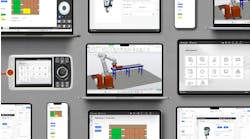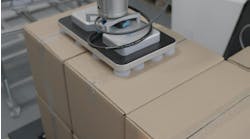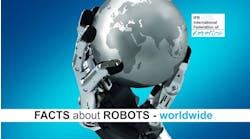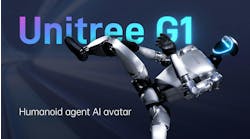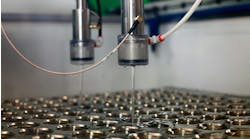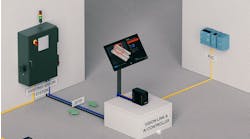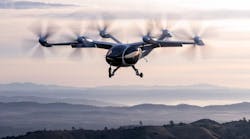Do ocean agriculture, modular furniture that retracts from the ceiling, soft tissue computer simulation and emotionally sensitive robots have anything to do with automobile production?
Why did Toyota Ventures, Toyota Motor Corporation’s first dedicated venture capital firm, provide early-stage investments for companies doing these sorts of things?
Take Intuition Robotics, for example. The company produces a robot named ElliQ, described as an “empathetic care companion,” appropriate for placement in assisted living facilities or nursing homes. ElliQ tells jokes, suggests breathing exercises to reduce stress, and reminds people to check their blood pressure.
More importantly, Intuition Robotics says that ElliQ is empathic towards its users, picking up on when someone feels down, perhaps because they didn’t sleep very much the night before.
“I think the way you should read that is if [Intuition Robots] are financially successful and it turns out there's a market there, Toyota may become interested in them,” says Jim Adler, founding managing director at Toyota Ventures.
“There are some investments that we have made in the past, where Toyota has sort of scratched their head and said, ’Why are you guys doing that?’ only for it later to become more obvious.”
“The best example, Joby EVTOL, the electric vertical takeoff and landing air taxi company, was an investment we made in 2017. And there was a lot of head-scratching around Toyota. Why would we do an investment like that?” Adler says.
“There wasn't a direction to say, Jim, go invest in an air taxi company, it was something that we saw in the marketplace…we said, this could be the one that wins.
“And if there is going to be a flying car, embodied in an air taxi service, we think it's important that Toyota gets a front-row seat to that innovation. And 18 months or so later, Toyota led its $600 million Series C round.”
Toyota Wasn’t Always About Cars
Toyota Ventures was founded in 2017 as Toyota AI Ventures. The fund looked for opportunities in artificial intelligence, autonomy, mobility, robotics, and cloud technologies.
Now, the firm manages a portfolio of 55 companies split between two different funds. The $350 million Toyota Ventures Frontier Fund builds on the organization’s original remit and adds smart city, fintech, digital health, energy, and materials startups to its portfolio.
The Toyota Ventures Climate Fund, launched as a $150 million fund in 2021, focuses on carbon capture/storage/transport, hydrogen production, and renewable energy.
Toyota Ventures looks for companies that may perform well in the marketplace first and then provide strategic value to Toyota later. The firm’s operational team provides guidance and strategic support, and the firm facilitates connections to teams at Toyota that provide technical, manufacturing, and supply chain expertise.
Even if Toyota scratched its head at the Joby Aviation investment, we’re still talking about cars, albeit flying ones, so the Toyota Ventures investment makes sense.
Investments like Apex.AI, AutoBrains, May Mobility, Metawave, Nauto, Perceptive Automata, and Recogni are no-brainers for any company interested in autonomous car development. (Boxbot develops autonomous package delivery systems, Burro develops autonomous agricultural robots and Sea Machines develops automated sea vessels, none directly related to autonomous car development but still obviously related.)
What about all those other investments that even tangentially don’t seem to have any relationship to car manufacturing?
“Toyota started out making industrial textile equipment, effectively looms, and it pivoted to cars in the 1930s. That pivot turned out pretty well,” says Adler.
“What really hit me and surprised me [after joining Toyota] was how deep the level of humility and entrepreneurship really does exist at the company. And our mission is to discover what's next for Toyota. It's not necessarily to find the next automotive innovation.”
Future IKEA, Space Balloons, and Video Games
Bumblebee Spaces, part of Toyota Ventures’ portfolio, creates modular furniture that installs into ceiling fixtures and lowers to the floor when needed. It looks like the sort of thing the Jetsons might purchase from IKEA.
“I think this really comes at the intersection of three evolving trends: robotics, smart cities, and consumer electronics,” Adler says.
“Urban environments are going to become denser over time. We felt like this was an incredible technology bringing together those three trends in a really smart way. Toyota announced a Woven City initiative a few years ago now, before the pandemic, a smart city which is sort of a living laboratory of all kinds of technologies.”
Near Space Labs provides low-cost, high-resolution satellite images via a zero-emission balloon fleet. Adler calls this a data play.
“When we saw what Near Space could do at a fraction of the cost of aircraft surveillance of disaster areas, farming, landscapes…we thought, wow, this is a deal you have to do, when you can see those ten times or more value creation, either in cost reductions or resolution or frequency of data gathering,” Adler says.
Ziva Dynamics develops software designed for films and games to create “high-quality virtual humans and creatures with dynamic muscles, fat, and skin that automatically flex, wrinkle, and move like they would in real life.”
Unity Technologies, a colossal presence in the video game development industry, on January 24 announced its acquisition of Ziva Dynamics, a move that makes all the sense in the world. Why did Toyota jump on board?
“We have been very bullish on simulation generally for a long time. We have another company, Parallel Domain, that creates 3D worlds, does sensor-type simulation. We were pretty early in the whole digital twin effort. And so we felt like as many breakout technologies that would bring digital twins to life, we thought those were important technologies,” Adler says.
Toyota Motor Manufacturing Hungers for Industry 4.0
The first Toyota Ventures call for innovation in 2018 focused on mobile manipulation and robotics and led to investments that included visual AI developer Elementary.
The second call for innovation, in 2020, focused on smart and connected cities and led to investments that included kitchen automation developer YPC Technologies.
The Toyota Motor Manufacturing, Kentucky (TMMK) plant, Toyota’s largest manufacturing plant in the world, helped inspire this year’s call for innovation, announced on March 17, focused on Industry 4.0 and sustainable manufacturing.
“TMMK has been the most hungry, the most innovative, the most entrepreneurial, the most prolific in working with our startups,” Adler says.
“They're the ones that are saying, Jim, we want more, more innovation, more startups. How can we get more because we love what we've seen? Because we see a lot of great technologies and having a call will actually focus the effort.
“I want to be clear, we don't speak for Toyota, right? We speak for Toyota Ventures,” Adler says.
“But we know that, broad strokes, the Toyota Production System is the envy of the world in manufacturing. We know that worker training and safety is job one. That's how you get standardized, reproducible output that has minimal flaws and errors. But Toyota can't stand still. Even though these ideals are timeless, how you implement these ideals will evolve with technology.”
